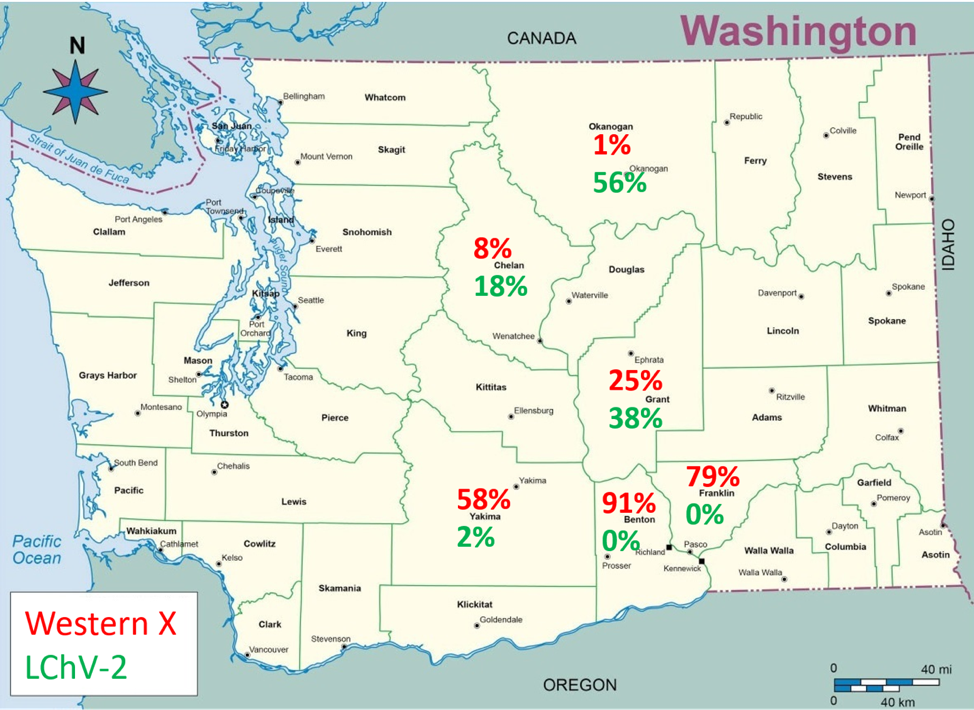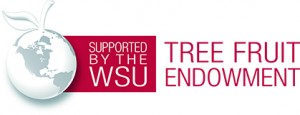Written by: S.J Harper, WSU Plant Pathology. October 2018.
The past year has been a bad one for the spread and incidence of little cherry disease in Washington. Overall incidence of both the Western X phytoplasma (Ca. Phytoplasma pruni) and Little cherry virus-2 are well into epidemic levels across the state. The incidence in individual orchards varies considerably, from a few scattered trees, often on the edges of a block – which is indicative of vector spread from the outside – through to 100% incidence in heavily hit areas. The only good news is that Little cherry virus-1 continues to be rare, which may be due to the absence of an insect vector.
In the last 12 months, the virus diagnostic laboratory at WSU-IAREC received over 1500 samples to test for the causal agents of little cherry disease. Of those, 24% had Western X, 15% had Little cherry virus-2, and less than 1% had Little cherry virus-1. Interestingly, when the results are broken down by location, a different pattern emerges (Figure 1).

Western X phytoplasma is the major cause of little cherry disease in the Columbia basin, spanning Yakima, Benton, and Franklin counties. Little cherry virus-2, while present, is not very common. The opposite occurs as you head north into Grant, Chelan and Okanogan counties, where Little cherry virus-2 is the most common, with lower incidence of Western X. This may be due to differences in vector population composition and/or dynamics in these two areas, or a geographic barrier such as the hills and mountains north of Yakima or Mattawa. We have also recorded Western X phytoplasma in peaches and nectarines in the Columbia Valley area; whether this is the result of movement to or from cherries requires further study.
There are no easy or painless ways of dealing with this disease. It will take a concerted approach of management of vectors, removal of infected trees, and replacement of removed plantings from pathogen-free sources. It’s also going to take a community-based approach because what you do affects your neighbors, and vice-versa. Work with your neighbors to identify and remove infected trees, and ensure that you ask about, or check, the replacement planting stock you use. As always, contact your local extension agents for advice what is going on in your area.
Additional information
Little Cherry Virus https://treefruit.wsu.edu/crop-protection/disease-management/little-cherry-disease/
X-Disease Phytoplasma (Western X) https://treefruit.wsu.edu/crop-protection/disease-management/western-x/
Grape Mealy Bug https://treefruit.wsu.edu/crop-protection/opm/grape-mealybug/
Apple Mealy Bug https://treefruit.wsu.edu/crop-protection/opm/apple-mealybug/
X-Disease and Little Cherry Virus Scouting and Sampling https://treefruit.wsu.edu/article/x-disease-phytoplasma-little-cherry-virus-scouting-sampling/
X-Disease and Little Cherry Virus Scouting and Sampling Guide https://treefruit.wsu.edu/crop-protection/disease-management/western-x/sampling-guide/
Western X Questions and Answers: What do we know? What do we not know? https://treefruit.wsu.edu/article/western-x-questions-and-answers-what-do-we-know-what-do-we-not-know/
BMPs for tree removal for X disease and Little Cherry Virus infected trees https://treefruit.wsu.edu/article/bmps-for-tree-removal-for-x-disease-and-little-cherry-virus-infected-trees/
Little Cherry Disease Eligible for Tree Assistance Program https://treefruit.wsu.edu/article/little-cherry-disease-eligible-for-tree-assistance-program/
LCD Task Force Rolls Out New Online Form to Streamline Testing https://treefruit.wsu.edu/article/little-cherry-disease-task-force-rolls-out-new-online-form-to-streamline-testing/
Contact
Department of Plant Pathology
Washington State University
509-786-9230 or scott.harper@wsu.edu
Tianna Dupont, WSU Extension (509) 293-8758 tianna.dupont@wsu.edu
Bernardita Sallato, WSU Extension (509) 439-8542 b.sallato@wsu.edu
Ashley Thomson, OSU Extension (541) 296-5494 Ashley.Thompson@oregonstate.edu
Karen Lewis, WSU Extension (509) 760-2263 kmlewis@wsu.edu
treefruit.wsu.edu webpages may only be republished with prior author permission © Washington State University. Republished articles with permission must include: “Originally published by Washington State Tree Fruit Extension Fruit Matters at treefruit.wsu.edu” along with author(s) name, and a link to the original article.

